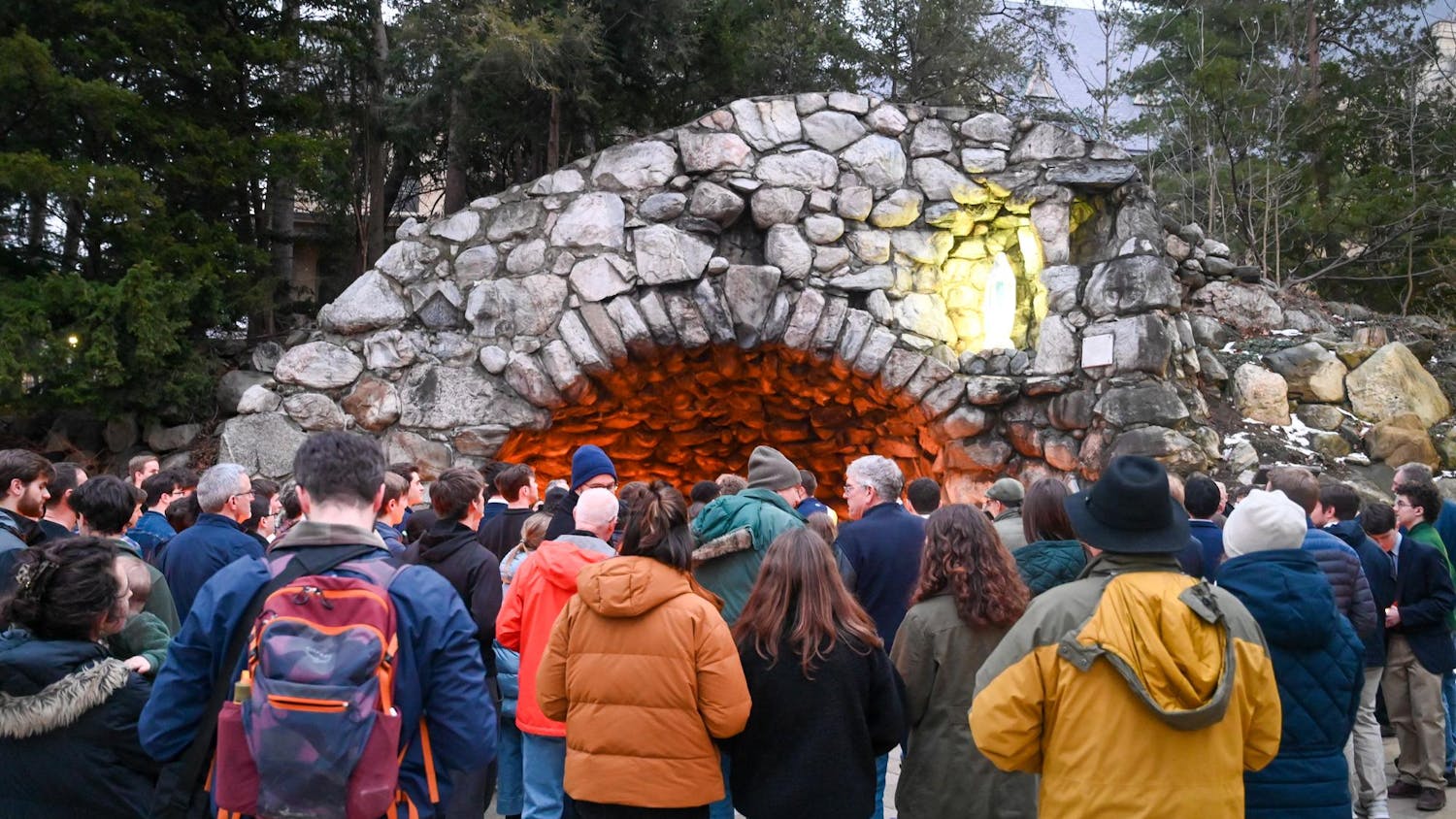Sr. Mary Prudence Allen discussed the dignity of human gender at the sixth annual Human Dignity Lecture on Tuesday night. In the talk, she mapped out the history of gender constructions throughout time, beginning with ancient Greek philosophy and developing to notions of gender in the 20th and 21st centuries.
She first identified the four elements in the concept of women, which was introduced in 384 B.C. as a part of Plato and Aristotle’s studies.
“The four elements across which gender theories center include opposites, generation, wisdom and virtue,” Allen said.
She said Plato was the first philosopher to acknowledge all four of these elements in discussing gender relations. He first initiated a philosophical understanding of gender with his “unisex theory,” which proposed that men and women have no significant differences and are therefore equal in dignity.
Aristotle, contrasting Plato, believed males to be naturally superior to females across all four of the gender concept categories — opposites, generation, wisdom and virtue — Allen said.
“Aristotle’s ‘sex polarity theory’ drastically opposed Plato’s foundations of thought,” she said.
Allen argued that while Aristotle was an empiricist, he did not possess a scientific understanding of the male and female bodies.
“Aristotle didn’t understand female ovulation, and therefore speculated that males provided the seeds of life, while women merely represented the material for life to grow,” she said.
In this way, Aristotle believed women to be defective forms of men, whose irrational powers could not be governed by the rational, Allen said. She said Aristotle asserted that women should remain silent in public and under men’s control.
“While Aristotle was consistent in his beliefs, he was consistently wrong,” Allen said.
While many of his beliefs relied on faulty biological assertions, Aristotle did assert that each human being consisted of both a physical body and a soul, Allen said.
“His metaphysics of hylomorphism discussed that the human consists of matter and form, that each human being possesses a composite identity consisting of soul and body,” Allen said.
The development of this idea influenced the studies of gender during the medieval period, she said. Medieval philosophers identified men and women as complementary — rather than opposed — beings, she said.
“Philosophy during this time relied on the Bible, and specifically the book of Genesis, to strengthen ideas of gender,” Allen said.
Allen said philosophers related passages from Genesis to demonstrate that although men and women have significantly differing bodies, they are equal in dignity and possess a synergetic relationship.
“In addition, the two genders function together in order to establish intergenerational fruition,” she said.
She said medieval notions of gender claimed the incarnation of Jesus Christ, his passion, death, resurrection, ascension and invitation to eternal life have the ability to be shared by all human beings, despite gender differences.
“St. Thomas Aquinas strengthened this view by developing a hylomorphism with the soul consisting of both form and spirit,” Allen said.
In the Renaissance and early humanist philosophic understanding of gender, Allen explained, an inevitable conflict arose in which the complementarity of gender was either threatened or defended.
“During this time, four areas of discourse were traced, including academic, satirical, religious and humanist views of gender,” she said.
While some traditional polarity satires devalued women, complementarity was defended by others.
“This complementary view of gender slid into a reverse polarity of gender, which actually devalued men as inferior to women,” Allen said.
These conflicting ideas of gender pushed into modern philosophical developments of gender, she argued.
“Cartesian unisex dualism was introduced during this time, which shattered the unity of the human being, but strengthened the equality of man and woman,” she said.
Gender in the 20th and 21st centuries has transitioned to an understanding of complementarity in men and women, Allen said, expressing concern that this view has been stretched to distortion within recent years.
“There have now been perversions, corruptions and decays in the idea of the human person as a result of changing views in its relation to sex and gender ideologies, secular feminism and philosophers turned atheists,” she said.
Allen said with new concepts of gender, feminism and atheistic philosophy arising, notions of gender have altered drastically.
“Gender reality includes the whole person, while gender ideology has focused on metaphysical identity and invented self-concepts of one’s gender,” she said. “Each person is created with dignity and should be seen as their whole person.”
Nun explores philosophy of gender
Sr. Mary Prudence Allen delivers the 6th Annual Human Dignity Lecture on Tuesday. Allen traced the philosophy of gender throughout the ages.
Sr. Mary Prudence Allen delivers the sixth Annual Human Dignity Lecture on Tuesday. Allen traced the philosophy of gender throughout the ages.









